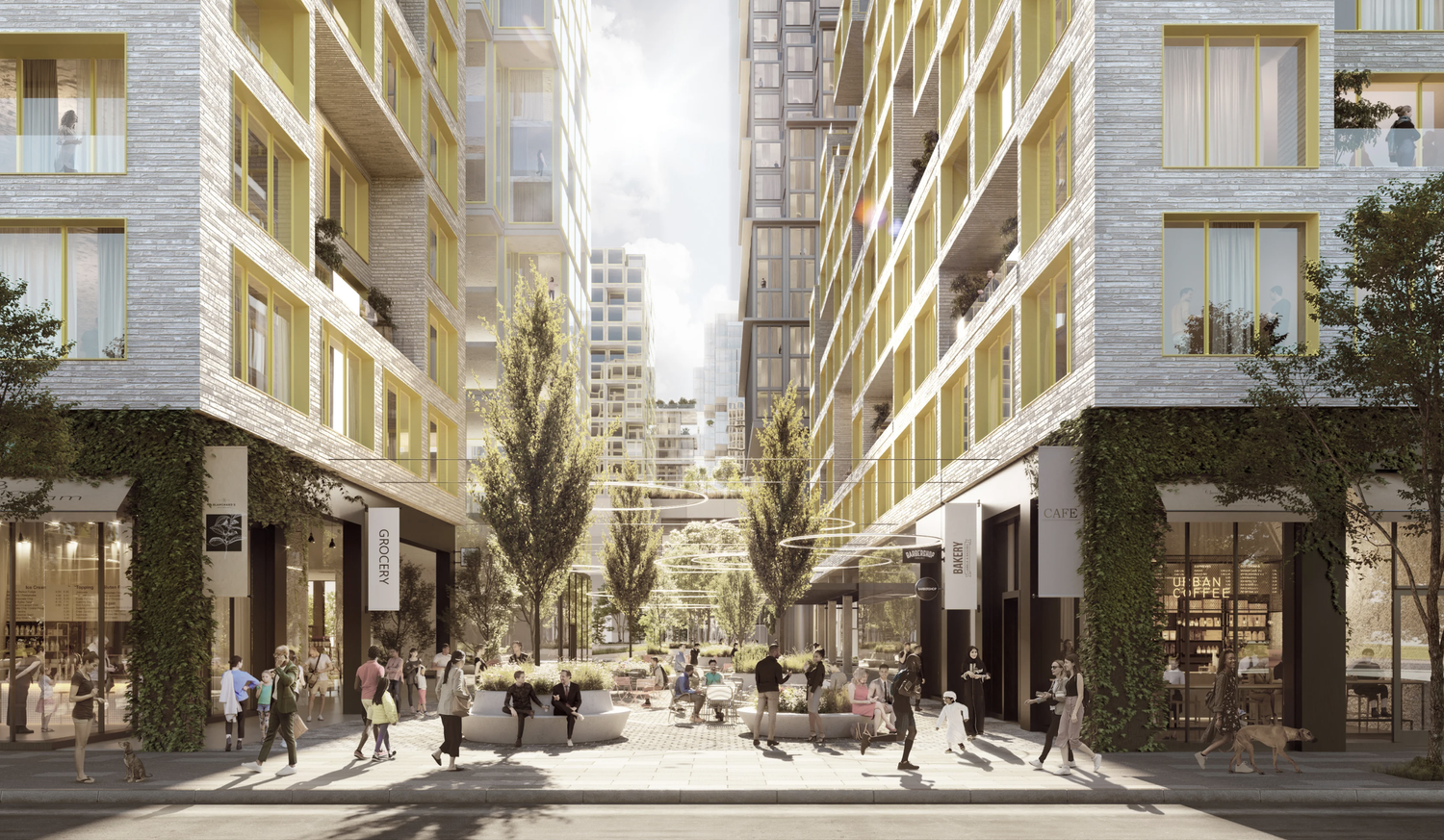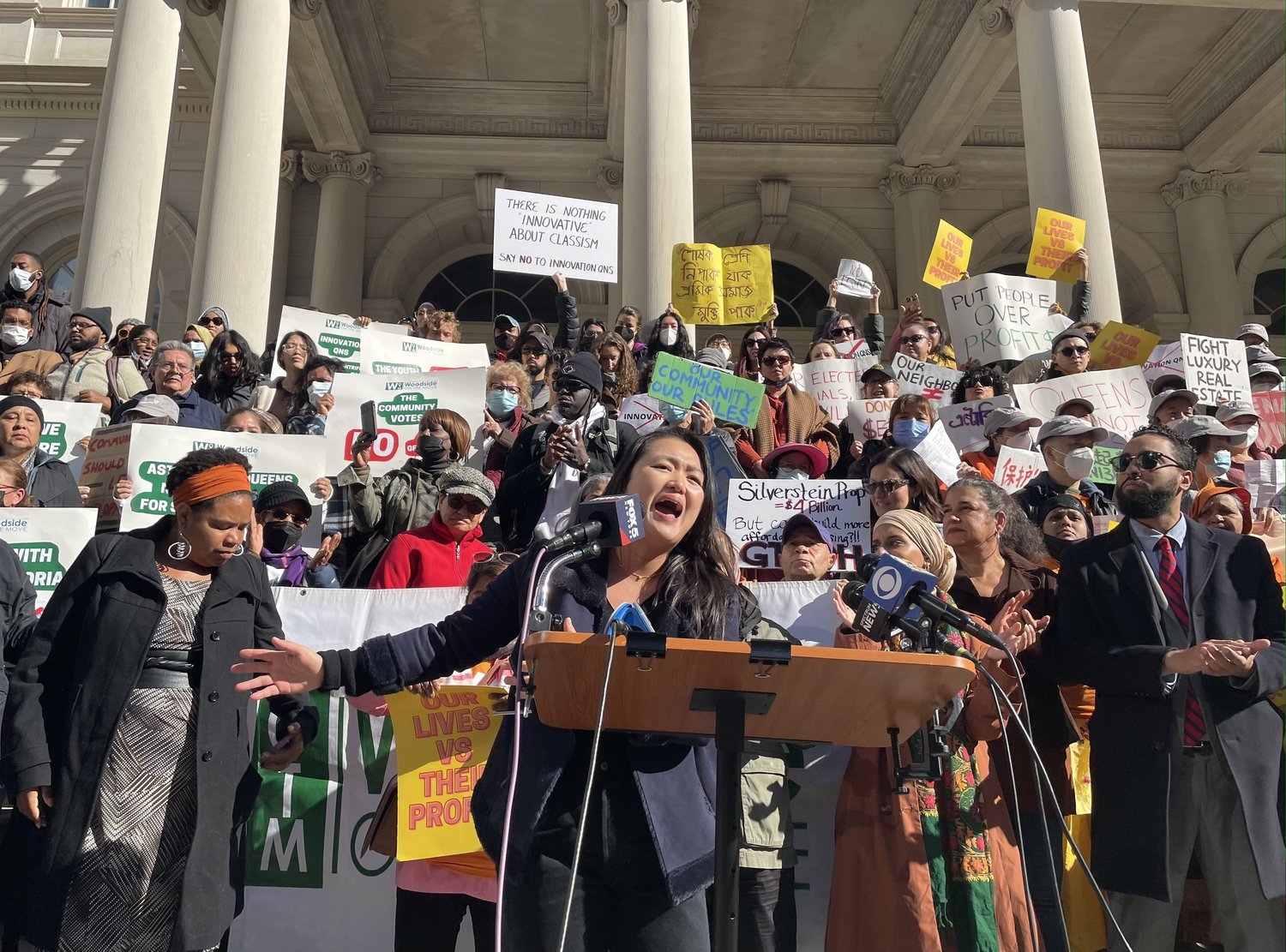Council subcommittee says 'yes' to Innovation QNS as negotiations come down to the wire
/The City Council’s Subcommittee on Zoning voted unanimously to approve Innovation QNS, a controversial development proposed for Astoria, on Thursday, Nov. 17, 2022. Rendering via Innovation QNS
By Jacob Kaye
Innovation QNS, the controversial five-block development proposed for the southeast corner of Astoria, was unanimously approved by the City Council’s Subcommittee on Zoning on Thursday.
While the project was largely expected to pass the subcommittee to allow for the Land Use Committee – and the City Council at large – to debate the merits of what would essentially amount to a new neighborhood in Queens, some new details about the evolving project emerged.
The development team behind Innovation QNS, which includes Silverstein Properties, BedRock Real Estate Partners and Kaufman Astoria Studios, have appeared to agree to increase the overall number of apartment units from 2,800 to around 3,200, according to City Council Speaker Adrienne Adams. Around 300 of the additional 400 units will be income restricted.
With negotiations between local City Councilmember Julie Won and the developers still underway, the exact number of affordable apartment units – and the income restrictions attached to them – could possibly change in the coming days. The council’s Land Use Committee is scheduled to vote on Innovation QNS on Monday and it’s possible a final deal isn’t reached until then.
“This vote is only a preliminary approval of this project,” Won said in a statement. “We’ve been negotiating daily to secure unprecedented levels of affordability for my immigrant and working-class community.”
Though he didn’t go into detail, Subcommittee Chair Kevin Riley said Thursday that the developers had agreed to cut back on some of the space reserved for offices and community groups to make room for the new units. None of the six other members of the subcommittee publicly asked questions about the changes during Thursday’s meeting.
Heading into Thursday’s vote, the developers had proposed making around 1,100 – or 40 percent – of Innovation QNS’ 2,800 units income restricted. Of those, 15 percent would be paid for with yet-to-be-secured city subsidies and the remaining 25 percent would be privately financed.
As of this story’s publication, 1,436 – or about 45 percent – of Innovation QNS’ 3,200 units would be income restricted. Of those, 500 units would rent at 30 percent of the area median income – or be made available to a single person making $28,020 or a family of three making $36,030. An additional 157 units would be set aside for currently homeless New Yorkers, according to Won’s office.
In recent weeks, Won has been pushing for around 55 percent affordability – with 40 percent privately financed and 15 percent paid for with city subsidies.
Also coming out of the most recent negotiations is a $2 million legal fund to be footed by the developers that would go toward anti-displacement and anti-tenant harassment, according to Won. Residents who live on the outskirts of the proposed development area have repeatedly expressed concern that Innovation QNS, if built, will invite speculation from other developers aiming to capitalize on the blooming of a new neighborhood.
“I am diligently finalizing negotiations for commitments from the developer and the Mayoral administration,” Won said. “As the council member, I will utilize every accountability measure to ensure that our community wins are actualized.”
City Councilmember Julie Won, who has so far opposed the approval of Innovation QNS, is continuing to negotiate with its developers. The negotiations will likely come down to the wire as the full council is expected to vote on the controversial project next week. Eagle file photo by Jacob Kaye
Innovation QNS’ development team did not respond to requests for comment.
Innovation QNS is a projected $2 billion, 2.7 million-square-foot mixed-use development proposed for the area from 37th Street to Northern Boulevard, between 35th and 36th Avenues. If approved, it would see the creation of over a dozen new buildings, some as high as 27 stories, featuring the new apartments, retail space, community facilities, two-acres of open space and a new movie theater.
It is the largest proposed development in the history of Queens.
The subcommittee’s vote on Thursday and the continued push to secure more affordable housing from the developers was celebrated by city leaders, including Mayor Eric Adams, who took a brief tour of the development area last month and has centered his approach to quelling the city’s affordable housing crisis on supporting private development.
“Today marks a new day for affordable housing in New York City,” Mayor Adams said in a statement. “We have a severe housing shortage at the root of our affordable housing crisis, and the only way to solve it is to build more housing — especially affordable housing. That’s what this administration is doing — building historic levels of affordable housing — and I am proud of what we have accomplished, working hand-in-hand with our colleagues in the City Council.”
Speaker Adams called Thursday’s vote – which also included two separate votes for housing projects in Brooklyn – a “first step to keep these projects moving forward as negotiations continue.”
“The conversations on these projects continue and additional votes remain, but it is clear that we must create thousands of affordable homes with deep affordability if we want to ensure our city remains a place for New Yorkers to thrive,” she said.
Mayor Eric Adams and Queens Borough President Donovan Richards celebrated Innovation QNS’ approval by the City Council’s Subcommittee on Zoning on Thursday, Nov. 17, 2022. Eagle photo by Jacob Kaye
Queens Borough President Donovan Richards, who initially voted against the project but came to support it in September when the developers committed to renting 40 percent of the units at income restricted rates, called the vote and the negotiations “progress.”
“I’m grateful to Chairman Riley and the entire Zoning Subcommittee for their work and their vote to advance Innovation QNS,” Richards said. “With more than 63,000 people in shelters, including asylum seekers, we must continue to do everything in our power to both preserve and build affordable housing, especially in communities with little to none of it. Queens can and must be the borough of yes.”
Affordable housing has long been at the heart of the controversy surrounding Innovation QNS, which has been in the works for over half a decade.
Both the local community board’s land use committee and the full board voted against the project over the summer. Richards also rejected the project in August. In all three votes, the developers’ commitment to affordable housing – which, at that point, was around 25 percent of the units, the minimum required of developers seeking a zoning change under the city’s first option of mandatory inclusionary housing – was the main reason for Innovation QNS’ rejection.
Hundreds of residents and housing activists testified against the project at the subcommittee’s seven-hour hearing on the project last month, vastly outnumbering those who testified in support.
Evie Hantzopoulos, a member of Queens Community Board 1 who helped lead the charge against approving Innovation QNS, said on Thursday that the current offer from the developer was a “vast improvement” over what the board had formally considered in June. However, she said the fight to secure more and deeper affordable housing continues.
“Those of us who have been involved in organizing against Innovation QNS believe that our community deserves to have its needs met and its needs to meet our affordable housing needs,” Hantzopoulos said. “While there have been many, many concessions, it's still not at the threshold that many of us believe is possible.”
Hantzopoulos said that one of her biggest concerns rests with the fact that around 16 percent of the units will rent at 30 percent AMI, a number she feels needs to be increased. She also remains concerned about potential displacement and future development in the neighborhood.
“We're still pushing for that deeper affordability,” she said. “I think that's really, really critical, because this project is going to have a long term effect, not just on the project itself, but also through subsequent rezonings that will occur.”
Farihah Akhtar, an organizer with CAAAV, one of the groups that has been organizing against Innovation QNS for months, echoed Hantzopoulos’ concerns.
“We're still extremely concerned and pushing for more,” Akhtar said. “And I think the main pieces are around depths of affordability and enforcement – so much of what is being negotiated and talked about is yet to be legally enforceable.”
In recent months, Innovation QNS has become a citywide issue. It has highlighted different approaches progressive lawmakers and moderate Democrats take toward solving the city’s affordability crisis.
On Wednesday, prior to the subcommittee’s vote, U.S. Rep. Alexandria Ocasio-Cortez, who had previously refrained from publicly weighing in on the project, said that she supports “Astoria community members in their push that any new major housing development be majority affordable.”
“We must move forward with a transformative vision of affordability in New York that makes major, strategic, and bold public commitments to housing,” Ocasio-Cortez said.
The project has also raised questions about the council’s longtime practice of councilmember deference, where land use decisions are deferred to the local member. Whatever Won’s ultimate decision on the project ends up being, the council will likely vote with her, if precedent holds.
The council’s Land Use Committee is scheduled to vote on Innovation QNS on Monday, Nov. 21. The full City Council is expected to vote on the project the following day.






